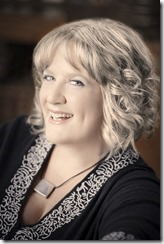 |
Name: VIC JAMES
Author of: GILDED CAGE (2017) On the web: www.vicjames.co.uk On Twitter: @DrVictoriaJames |
Vic James is a current affairs TV director who loves stories in all their forms, and Gilded Cage is her debut novel. She has twice judged the Guardian’s Not the Booker Prize, has made films for BBC1, BBC2, and Channel 4 News, and is a huge Wattpadd.com success story. Under its previous title, Slavedays, her book was read online over a third of a million times in first draft. And it went on to win Wattpad’s ‘Talk of the Town’ award in 2015 – on a site showcasing 200 million stories. Vic James lives and works in London.
Thank you, Vic, for taking the time to chat with us.
My very great pleasure, Matt!
The first thing that strikes the reader as they start Gilded Cage is the strange new world you have created, a contemporary Britain in an alternate universe, where ten years in slavery is mandatory for all commoners. Where did the idea for the “slavedays” come from, and how did the world develop as the story progressed?
I’m a current affairs TV producer/director by trade, and the story idea came to me while working on a BBC2 series called The Super Rich and Us – a slightly silly title for a serious look at widening wealth inequality and stagnating social mobility. I was speaking to billionaires, getting a glimpse into their world, and the thing none of them doubt is their ability to change the world through their wealth. That seemed to me to be almost the same as magic.
But I didn’t want this magic to suddenly appear. In the world of Gilded Cage, it has always been present, and 400 years ago the magical elite seized power in a reimagining of the Enlgish Civil War. The slavedays system was created at that time, so it takes the form characteristic of that period: a kind of indentured service. But the experience as described in Gilded Cage is a distillation and concentration of all that’s most unfair in our world today: grinding work, dwindling opportunity, educations wasted on unrewarding jobs, unaffordable homes, etc etc.
As for how it progresses, well, history is a theme in the books: learning from, repeating, or avoiding the mistakes of the past. You’ll have to wait till book 3, BRIGHT RUIN, to see which of those it is!
The book shows this world from the viewpoints of two very different families: the Hadleys who are just starting their ten-year period of slavery; and the Jardine’s, who are at the opposite end of the social scale. Do you find that there is much difference in how you write these different outlooks on the world, or is it relatively easy to switch between one and the other?
It’s much easier than I expected! Partly that’s thanks to my own family background: my parents are from the East End, my dad left school with no qualifications and my mum dropped out to marry him as a teenage bride. Then I won a scholarship to a school full of rich (if not terribly academic) kids, and went to Oxford where I met people who had actual titles and family fortunes in the millions and, yes, billions.
But I think it’s also because, whatever our class or background, whatever that top layer of perception or prejudice, deep down we all want the same things: freedom, love, justice, autonomy.
And on a related note, which is your favourite character to write?
Probably no surprises here, but I do love writing Silyen, the dangerous and gifted youngest son of the Jardine family. I have to ration writing from his perspective, because his goals and motivations are a key part of the plot drivers, alongside Luke and Abi Hadley’s pursuit of justice and truth. But there is more from his POV in book 2, and more again in 3 as his true interests become clear. In book 1, readers sometimes get the impression that Silyen is (i) all-powerful and (ii) has a master plan. But – without spoilers – we come to see that’s not quite the case!
Alongside the novel’s central plot, there’s a lot of political manoeuvring and back-room dealing, which, in turn, leads to a very complex, very involved plot. How much of Gilded Cage did you need to plan before you started writing the book? And did you find that your end-point changed as a result of unexpected events?
Great question! I absolutely loved this aspect of writing the book. I love twisty plots, and that moment at the end when you look back and see that everything you needed to know was there all along. Still, it turns out that writing a book like that is more effort than the best examples of the genre make it look!
I began the series knowing where it ended. In fact, the beginning and end were the first two things that came to me: a girl running desperately towards a wall, and a boy … no! Wait! You nearly had me there.
Because I know my characters inside and out, the action begins and ends in their motivation, so if I ever hit a knotty bit of plot (ie. what I think should happen) I can sort it out by simply working through how my characters would respond (ie. what they tell me happens). We usually agree. When we don’t, they win.
Dystopias must be an increasingly difficult sell in a world that seems to be moving in that direction itself. While there are elements (e.g. the magic) in your tale that are pure fantasy, do you feel that there’s a possibility of life imitating art if things continue as they are?
Life is art is life. It’s a continuous dialogue. These books could only have been written now, and I’m sure readers will spot plenty more current parallels in book 2, as well!
What’s next for the Hadleys, and how far into the trilogy have you already planned? Do you see further books set in the same world?
Terrible challenges. Momentary happinesses.
To the end.
And I’ll let you answer that third question when you’ve finished book 3, because it assumes we end in the same world we’ve started in. *cackles in all-knowing authorial fashion*
What authors or works have influenced you as a writer?
Simply can’t answer this. As a child I was the bookish equivalent of a Dyson vacuum cleaner – I hoovered up everything. That dust bag is my imagination.
And as a follow-on, is there one book (or more than one) that you wish you had written?
We all write our own books. I can tell you one book I adore, and that is Mikhail Bulgakov’s The Master and Margarita. I also love Nabokov’s Pale Fire. And some particularly twisted Japanese folk tales.
 What does a typical (writing) day in the life of Vic James look like?
What does a typical (writing) day in the life of Vic James look like?
Wake. Sit at desk. Write. Coffee. Write. Lunch. Write. Tea. Write. Supper. Write. Sleep.
(Wait, I should have put something in there about getting dressed, right…?)
And what advice would you have for people hoping to pursue fiction-writing as a career?
Give yourself permission to take your writing seriously.
To expand: As an unpublished author, it’s very easy to feel – or be made to feel – that writing is an indulgence, or an impossible dream. It isn’t. But it is exhausting, painstaking, and there is never a guarantee of success. Improve your odds by making it a priority. When the idea for Gilded Cage came to me, I knew it could be ‘the one’. I was also in the middle of a massive project at work. So I cut everything that wasn’t work or writing: ie. sleep, and a social life. It was worth it.
What are you reading now, and is it for business or pleasure?
My TBR is as tall as a towerblock right now. And there’s no such thing as reading that’s not for pleasure. The very act is pleasurable.
If Gilded Cage should ever make the jump from page to screen, do you have any dream casts/directors/whatever?
For the director, anyone with ambition and vision – books 2 and 3 just get bigger and bigger. For the cast, whoever walks into an audition and speaks in my character’s voice. You know it when it happens.
And while we all wait for the movie *drums fingers* may I recommend the audio book? I got my dream narrator, Avita Jay, and sat in on 2 of the 4 recording days and she is absolutely sensational. Her performance paints the scenes as you listen. And her performance of Dog alone is worth the price.
And finally, on a lighter note…
If you could meet any writer (dead or alive) over the beverage of your choice for a chat, who would it be, and what would you talk about (and which beverage might be best suited)?
Christopher Marlowe, Elizabethan playwright, poet, and spy. I’d get him to tell me tales of his adventures – and whether he really did die, stabbed through the eye in a Deptford pub. Ale would be the tipple of his time, but I would take him to Bar Nightjar in Old Street, for devastating cocktails – I’m sure he’d fit right in.
Thank you once again, Vic, for taking time out to share your thoughts.
My absolute pleasure, and thank you so much for having me!
Gilded Cage by Vic James is the first instalment of the Dark Gifts Trilogy. It is published in paperback 26 January 2017 by Pan Macmillan, priced £7.99. Be sure to check out the other steps on the Blog Tour.


One thought on “An Interview with VIC JAMES”